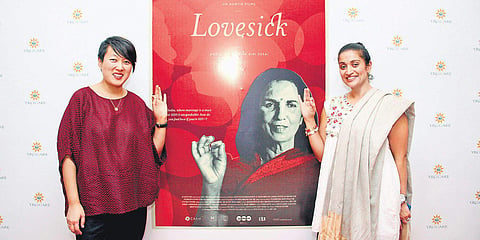

The documentary film ‘Lovesick’ introduces us to the late Dr Suniti Solomon wearing a bindi. She explains that it is worn by married women. What makes this seemingly simple act take on a whole new dimension is when one realises that Dr Solomon is a widow, but continues to wear a bindi because her husband always encouraged her to ‘do what she thinks she liked.’ ‘Lovesick’ is the feature documentary directed by Ann S Kim and Priya Giri Desai, who spent eight years following Dr Suniti’s work, not just as a doctor, but also as a matchmaker.
The film made its India premiere at the JIO MAMI Mumbai Film Festival last month. A special screening was held in Chennai to a packed theatre, where people braved the rains to watch a different kind of love story — a positive one. In 1986, Dr Suniti discovered India’s first case of HIV. Her achievements are well-known, making her a pioneer and towering figure in the field. What is lesser-known is the woman behind these achievements. The sensitive soul who came up with the idea to bring together HIV positive people so they too could enjoy companionship and the joys of family life.
“I read an article about Dr Suniti and that what led to us meeting her,” said Priya. “She was the perfect interplay between traditional and modern. The pragmatism with which she handled matters was incredible. How do you not tell the story of a woman like that?” The film interweaves Dr Suniti’s unconventional personal and professional journeys with the lives of two patients — Karthik, a reticent bachelor and Manu, a bubbly IT professional who, like many HIV positive women in India, was infected by her first husband. It traces their journey of love and finding light at the end of the tunnel while surviving under the shadow of HIV. The process of filming, however, was long and arduous.
“It took us eight years and by the end of it we had 250 hours of video footage to edit,” said Ann. “But from the moment we met Dr Suniti in 2008, we knew she was special and spectacular. Even with Karthik and Manu, we followed their journey, but made sure we were also tracking other people because we did not know how things were going to end with both of them. Karthik was quite frustrated at that point and had pretty much given up hope. Even the counsellors thought that he would not be getting married. So we made sure to follow others as well.”
Through their story, they manage to give the audience a glimpse into the doctor’s personal life. Some of the best moments are of Dr Suniti with her golden retrievers, chiding them to get off the bed or enticing them with cake. The makers bring out her own love story and married life with her husband through stray mentions of incidents and her sharing some of the letters he had written to her. While love letters may have made way for e-mails and SMS in the film, it leaves the audience with hope that love will find a way — regardless of the generation or medical condition one may be faced with.
The film also sheds light on how hard it is when matches are not made in heaven, but in the clinic. In a memorable scene, one of the matchmakers who works at YRG CARE said because these patients were HIV positive, did not mean that they had no expectations. These expectations ranged from wanting a ‘fair girl’ to a ‘well-educated girl’ or a ‘thin girl’ in addition to specifications of caste and religion. However, the ratio of male profiles to female profiles was grossly unproportionate, often leaving the matchmakers Annie Zachariah and Rochelle D’ Souza with counseller Lakshmi Prasad in a fix.
At the end of the screening, an interactive session was held with Dr Suniti’s son, Dr Sunil Solomon, the filmmakers, the matchmakers and the couple — Karthik and Manu who have been together for three years now.
When asked about how comfortable they were about their story being shared, Karthik said, “Initially, we were skeptical. But, at some point, we realised that we have to evolve. Like Dr Suniti said, if HIV was found in a child and not a sex worker, would the same stigma be attached to the disease?” Be it in her wearing a bindi after her husband’s death or treating patients with HIV when no one else was willing to touch them, Dr Suniti was radical, yet rooted. This film gave us a memorable love story — ‘Karthik Weds Manu,’ as a member of the audience said.
Dr Suniti’s stellar achievements:
In 1986, Dr Suniti Solomon detected the first case of AIDS in India
She was a visionary in the field of microbiology,a teacher and an activist.
She was posthumously awarded the PadmaShri by the government of India for hercontribution to the field.
Along with her student, she was able toidentify six sex workers in Chennai who were afflicted by the disease.
She established the YR Gaitonde Centre forAIDS Research and Education (YRG CARE) in 1993.
She died at the age of 76 after fightingcancer in 2015.